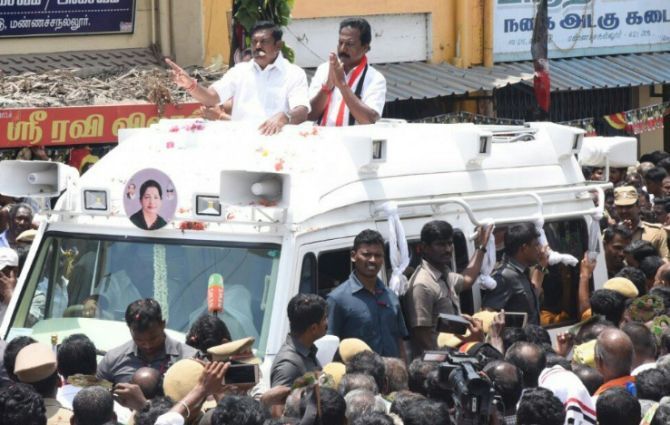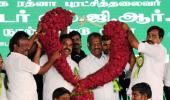The ruling party's decision to serve ‘disqualification’ notice to three party MLAs when polling for four more assembly by-elections are due for May 19 may have been taken to keep the flock together post-results, rather than seek to lose more than already, but it has sent out alarming signals in a state ruled till recently by an Iron Lady, says N Sathiya Moorthy.

With results for the all-important nation-wide Lok Sabha polls and those for a record 18 assembly by-polls in the state due on May 23, the ruling AIADMK in Tamil Nadu has displayed an uncanny and uncharacteristic nervousness unbecoming of late leader, Jayalalithaa Jayaram.
The decision to serve ‘disqualification’ show-cause notice to three party MLAs when polling for four more assembly by-elections are scheduled for May 19 has reportedly demoralised the cadres, who too tend to feel that the leadership has given up on retaining a legislative majority in the normal course.
Adding to the ruling party’s immediate woes is a subsequent no-trust move that the Opposition DMK has since moved against assembly speaker P Dhanapal, who was elected on the AIADMK ticket. Under the rules, the speaker’s office has to respond to the DMK within a fortnight. The speaker has to dispose of the same, traditionally by facing a no-trust vote, with the deputy speaker in chair, before the house can take up other substantive matter. Translated, the no-trust vote is also a vote on the government’s majority.
Smelling possibilities, the DMK had stated that if the ruling party tried to upset the legislative equilibrium by taking the disqualification route, they would move a no-trust motion against speaker Dhanapal. Under the relevant law and rules, the speaker’s no-trust vote precedes all other legislative measures. If the ruling party suspected the loyalties of some of its members, and they were not unwilling to vote against the government, then long live the ‘defectors’, seem to be the DMK’s line of thought.
It’s obvious that Dhanapal cannot take up other legislative matters in the house whenever it reconvenes before disposing of the no-trust move, if the speaker’s secretariat found no procedural or drafting flaws in the DMK document. Nor can he chair the session until the no-trust motion/vote is behind him, one way or another. The question is if speaker Dhanapal can now swear in new members to be declared elected on 23 May, or deputy speaker Pollachi V Jayaraman can do the honours.
No precedent seem to exist in the matter, possibly outside the state, too, but if such a course is not disallowed prima facie, the question arises if the ruling party fears near-rout in the 22-seat by-polls. The first leg of the poll campaign this time was marred/marked by big-time social media campaign about the ‘Pollachi sex scam’, where the deputy speaker came in for avoidable criticism over alleged involvement of his sons. The case is now being handled by the CBI. It is not unlikely that the Opposition may raise a bigger ruckus both inside the house and outside if and when he were to chair house sessions when the speaker is to recuse himself under mandatory provisions.
Should the AIADMK have even a contestable chance for proceeding with the private swearing in of new members even if by deputy speaker Jayaraman, it begs reason why the party is so nervous and wants more disqualification from its ranks even before the by-poll results are out? After all, even Opposition members, if declared elected in the by-polls, would not want to delay their being sworn in, early on. The DMK, which has fielded alliance candidates for all 22 seats, and so has the AMMK independently, too would not want to cite procedural reasons for boycotting the event, if it were to be held during the current interregnum.
In the immediate context, it could well mean that the AIADMK seems unsure of winning the required nine seats to stave off a no-trust move, be it against speaker Dhanapal now or chief minister EPS on a later date. A sympathetic interpretation is that the ruling party wants to keep possible/prospective ‘defectors’ under check, hoping that threat of disqualification would work. Including AMMK boss, T T V Dhinakaran, who recorded a massive victory for Jayalalithaa’s R K Nagar seat in the Chennai suburbs, the ‘rebels’ now seem to have four votes on their side. Include two independent party legislators who had won on the AIADMK’s ‘Two Leaves’ symbol in Elections-2016, the figure goes up to six.
The AIADMK’s current strategy thus seems to try divide the ‘rebels’ by serving notice only on three of the existing five. It should have felt hopeful by the precedent set by present-day deputy CM Panneerselvam, when the DMK had moved a no-trust vote against CM Palaniswami when the post-Jaya AIADMK’s internal troubles were at their peak. Possibly fearing disqualification when it became evident that they did not have the numbers, the 11 OPS legislators boycotted that vote. It is another matter the DMK has moved the courts, seeking their disqualification. The matter is now in the supreme court, after the high court ruled in favour of speaker Dhanapal’s decision not to disqualify OPS-11.
As if these were not enough ahead of the four-seat by-polls, deputy chief minister and AIADMK coordinator, O Panneerselvam has since issued a statement, declaring that he had no intention of joining the ruling BJP at the Centre, as rumoured in a section of the local/social media.
The rumours began doing the rounds after Prime Minister Narendra Modi chose to campaign in Theni Lok Sabha constituency, where OPS’s son, Raveendranath Kumar. is the AIADMK candidate. The father-son duo, who were earlier seen as having easy access to the PM and other BJP leaders in Delhi, fed the rumour mill even more by participating in the Varanasi rally when Modi filed his nomination papers a few days later.
There are apprehensions that the OPS-BJP rumour may have been floated by rival camps within the AIADMK, which continue to feel uncomfortable with the deputy CM’s continued access to powers-that-be in Delhi. Anticipating bad news on May 23, there also seems to be a veiled attempt to blame it on the ‘BJP alliance’ and blame the alliance, in turn on OPS. The expectations are also that the OPS camp may do relatively badly in their southern stronghold, losing votes, if not seats seats, to the AMMK – which may go to the rival DMK-Congress combine.
As chief minister, who is seen as following in Jaya’s footsteps to get full control of the party before long, EPS however is not known to have displayed vitriol of any kind against his boss-turned-deputy. However, a section within the party is hopeful that on May 23, the CM would be able to deliver his native western region to the party and also the BJP and PMK allies, who have their own vote-pockets there. They, more than the political Opposition, seem wanting to sow seeds of dissent and discontent within the party, which can ill-afford it until a clearer picture emerges, all-round.
It all started with Chief Minister Edappadi K Palaniswami, who is also the joint party coordinator, with OPS as coordinator, causing speaker Dhanapal to issue show-cause notice to three AIADMK legislators -- E Rathinasabhapathy (Aranthangi), V T Kalaiselvan (Vriddhachalam) and A Prabhu (Kallakurichi), allegedly for ‘anti-party activities’. The three were known supporters of one-time party rebel, T T V Dhinakaran, now heading the break-away Amma Makkal Munnetra Kazhagam.
Incidentally, between the two rounds of by-polls, Dhinakaran has moved the Election Commission for full recognition of AMMK as a political party with ‘reserved symbol’. Based on a last-minute Supreme Court order, the EC had allotted the Dhinakaran nominees a common ‘Gift Box’ symbol, but after the results the winners, if any, from this group will deem ‘Independents’ in the House.
In what remains a delayed/belated tactical move, Dhinakaran, now seems to have given up hopes of getting back (into) the AIADMK. His jailed maternal aunt, V K Sasikala Natarajan, the party’s last ‘elected’ general secretary, who had named him her deputy, has near-simultaneously moved the Supreme Court, challenging the Delhi high court’s denial of AIADMK party name, flag and title, to her faction.
The high court was not impressed by the aunt-nephew duo’s argument that the AIADMK’s unique constitution provided only for an all-important general secretary, directly elected by all primary members of the party, and that there was no provision in it for posts like coordinator and deputy coordinator.
The current political confusion-cum-instability had its origins in the ruling party getting speaker Dhanapal to ‘disqualify’ 18 MLAs for identifying with the Sasi-Dhinakaran group. This caused by-elections to as many seats, when the faction decided not to appeal the judgment of the SC-appointed third judge of the Madras high court, ruling on an earlier split-verdict. The remaining four by-polls have been caused by death or court orders -- or, both.
Of the four, by-election in southern Tirupparankundram constituency followed the death of the incumbent, A K Bose, who had succeeded fellow AIADMK candidate, who died even before being sworn in. In a unique turn, the HC invalidated Bose’s election after his death. In doing so, the court upheld the rival DMK nominee’s charge that from her hospital bed, Jayalalithaa as AIADMK general secretary was in no position to voluntarily affix her signature to the mandatory Form-B for EC to allot the party’s reserved ‘Two Leaves’ symbol for Bose.
Included in the May 19 by-polls is Aravakurichchi, where the EC countermanded polling for election 2016, along with that in Thanjavur, following claims and counter-claims to misuse and abuse of money power. Ironically, the DMK has now fielded Senthil Balaji, incumbent minister who was the ruling AIADMK candidate in the countermanded polls, who also won the seat later. Post-Jaya, he was one of the 18 disqualified MLAs, but has since migrated to the Opposition DMK, whose local cadres seem to be feeling uncomfortable at the prospects of campaigning for him -- all within three years.
Incidentally, the 18-MLA disqualification and the pending notice to three more are not the only ones involving the TN assembly now. The HC has stayed proceedings over speaker Dhanapal’s notice to 21 DMK legislators, including Leader of the Opposition, M K Stalin, for their allegedly disrupting House proceedings.
The DMK too has appealed against a HC ruling, which in turn upheld the speaker dismissing the party’s petition for disqualifying 11 AIADMK legislators, including OPS. Estranged from the party after the Sasikala leadership had replaced him as CM in the months following Jayalalithaa’s death, Team OPS had boycotted a trust-vote on successor EPS, defying a party whip to participate and vote.
It is not as if the AIADMK strategists would not have visualised the possibilities. For its part, the DMK did declare its intention to move a no-trust move against speaker Dhanapal if he acted on the ruling party’s petition to ‘disqualify’ three more MLAs ‘unconstitutionally’. Dhinakaran, for his part, has since asked why the EPS-OPS leadership has picked up only the three, leaving out two more who had openly campaigned for the Opposition DMK. The two, actor-politician Karunas and Thameemun Ansari, head two independent parties and won their seats on the AIADMK symbol.
Apart from being uncharacteristic, the AIADMK’s nervousness may also be uncalled for, just now. It is not unlikely that the leadership has issued the statutory notice, more to keep the flock together post-results, rather than seek to lose more than already. Yet, as the 18-member disqualification showed, it also brought down the bench-mark requirement from the existing half-way mark of 118.
It is another matter that even if the AIADMK loses house majority, it would not translate into constitutionally and politically sustainable majority for the DMK-led rival combine, which alone seems to be a possible alternative. In the post-Jaya confusion prevailing in the AIADMK, DMK’s Stalin was believed to have concluded that a defectors-backed government was not sustainable over the medium term, and that they would have to go in for fresh elections to the state assembly.
There are issues, even there. Even if the numbers don’t add up in the DMK-Congress combine’s calculations, they would have to satisfy Governor Banwarilal Purohit. If all of it still led to the imposition of President’s rule in the state with or without assembly dissolution alongside, the Centre’s decision in the matter would require a ‘DMK friendly’ government at the Centre.
Any presidential declaration in the matter would have to be suo motu cleared by the Supreme Court, though within three months. Incidentally, other than death penalty, ‘assembly dissolution’ is the only instance where a suo motu clearance lies with the higher judiciary, the latter thanks to the SC verdict in the ‘S R Bommai case’ (1994).
But then, the AIADMK leadership does not seem confident to be able to hold on until the anticipated developments takes the state thus far -- or, that is the picture they are paining just now.
N Sathiya Moorthy, veteran journalist and political analyst, is director, Observer Research Foundation, Chennai chapter.










